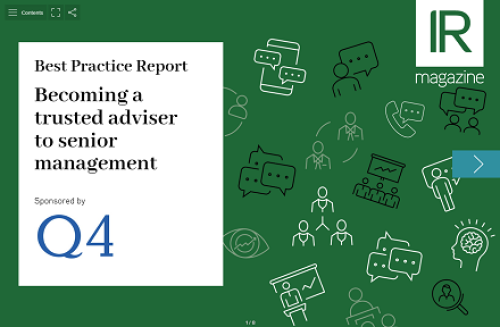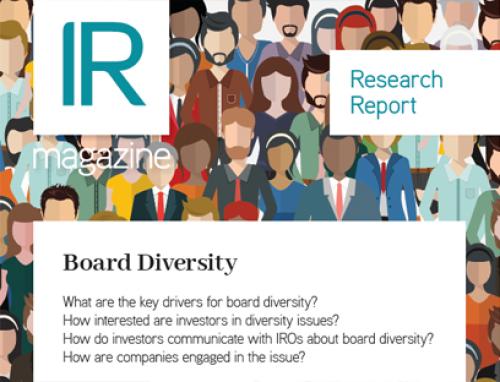More than 100 people gathered in Toronto earlier this month for the latest installment of IR Magazine’s women in IR series of events, all focusing on the question of how to achieve greater gender balance in the investor relations profession.
The series was sparked by IR Magazine’s discovery that women are less likely to hold senior IR positions than their male counterparts – despite a 50/50 gender split in the profession – and that the women who do make it to senior positions are less likely to be paid as much as their male counterparts. A global campaign of articles, videos, podcasts and events has followed, taking place so far in New York, Toronto, London and San Francisco.
‘In IR we’re used to talking about everything else apart from ourselves, and as women I think that comes naturally to us,’ Lisa Greatrix, senior vice president of finance and investor relations at Canadian Tire, said at the start of the event.
A panel of industry experts dispensed advice that can be grouped into four categories: building knowledge, building relationships, building inclusive cultures and finding balance.
Building knowledge
The latest Women in IR research report from IR Magazine revealed that male IROs are more likely to come from a finance background, while twice as many women as men come from a marketing background. Women from a communications or marketing background are least likely to be high earners, while men and women from a capital markets background have the best pay and career development in IR.
This set the tone for the panelists to discuss their career backgrounds and the extent to which finance experience is essential to a successful career in IR. Greatrix started her career in finance and said that having an understanding of the way the public markets functioned – including having exposure to IPOs and M&A activity – was influential in her moving into IR, which she described as ‘the next logical step.’
But that wasn’t the case for the other two panelists. Lisa Doddridge, director of investor relations at First Quantum Minerals, started her career in marketing and knew immediately that it wasn’t the right fit. ‘I was pushed into marketing and it wasn’t good for me,’ she said. ‘I don’t like pretty pictures. I like numbers. I had to fight to get into IR. I had to know my numbers and show that I could get people to understand the numbers in the blink of an eye.’
Rebecca Corbin, founder and CEO of Corbin Advisors, recalled her early career at Thomson Reuters. ‘I taught myself finance,’ she said. During her early career, she gained confidence from immersing herself in data and then extracting insight from it. The takeaway for the audience was clear: ‘Find your core expertise. Really develop [that] so you’re seen as a value-added resource.’
Building relationships
The panelists commented that building knowledge was crucial to gaining confidence in IR, which made the next recommendation – to build meaningful relationships – easier.
‘Building relationships is about listening to people and then helping them with what they need,’ Greatrix said. ‘In IR we’re unbiased. There’s no agenda or ego. We build relationships and connect with people – even the people who are difficult to win over.’
Doddridge agreed, explaining that transparency and reliability are also central to IR professionals building relationships with senior management, investors and analysts. ‘It’s all about building trust,’ she said. ‘I’m fairly well known for my honesty and my ability to answer a question directly. I’m trusted and integrity is clearly an important part of what we all do.’
All of the panelists explained that it’s not uncommon for them to be the only woman in a meeting. But rather than see that as a source of insecurity, event moderator Jacqueline Wagenaar, vice president of investor relations and corporate communications at Guyana Goldfields, said it can be a strength. ‘There’s intrigue in being the only woman in the room. Play with that and take power from it,’ she said.
Corbin followed this with some observations about what the investment community looks for in a best-in-class IRO, based on her firm’s research. ‘Investors want people who are a useful resource, who sit down and go through the financials [and] the messaging. The table stakes are transparency and immediacy. As you become an expert in your company, in your management team and on sentiment, that’s when you get to start weighing in on strategy. The best-in-class IROs are seen as an extension of management,’ she said.
Building inclusive cultures
The women in IR campaign is, unfortunately, a reflection of gender issues across the business world and in society as a whole. The panelists explained that as senior IR professionals with regular access to senior management, there is an opportunity to provide input on corporate cultures and issues that might favor men over women – even when they’re unconscious.
‘I work in an old school industry [largely] dominated by men,’ Doddridge said. ‘In my last job I had quite a large team and I created a culture that was open to men and women. If you don’t see that, do little things to support it. We can be agents of change in a corporate environment.’
Greatrix agreed, saying: ‘You are part of the culture. Do something every day to try to impact that culture positively.’
The issue of culture is increasingly an IR issue, Corbin added. ‘We identified that investors are digging into corporate culture. If you think about how much America bent for millennials, it can happen for us too. Culture does matter from a performance perspective,’ she said.
Finding balance
One of the cultural issues that arose was whether workplaces are configured to help men and women adequately deal with parenting, ageing parents and other personal issues.
‘If this was a men in IR conference, we wouldn’t be talking about work-life balance,’ Doddridge said. ‘I don’t think I’ve worked for many companies that are supportive. Work-life balance can be tough to achieve.’
She added that, in her opinion, women are less comfortable saying no to their colleagues than men are – but she suggested that should change. ‘Let’s get men used to us saying no. You have to know when to say no,’ she said.
For Corbin – who has four children between the ages of 23 years old and 14 months old – it’s important to have a set routine and support network to ensure that she doesn’t feel that her time at work isn’t overrun by her family, and vice versa.
‘I wouldn’t be whole if I wasn’t an entrepreneur,’ she said. ‘I’m passionate about being a wife and mum, but I also have things that I want to achieve.’ She added that it’s been important to carve out parts of the day that are enshrined as family time, and parts of the day that are clearly dedicated to work.
In similar spirit, Greatrix said work-life balance is hard to achieve but that it’s up to the individual to determine what balance means to them. ‘I believe that when you love what you do, you’ll find balance,’ she said. ‘It won’t be equal, but you will find a balance. Love what you do and accept the hours that you have to put in.'











